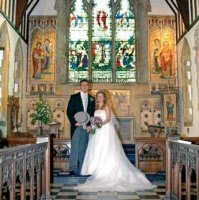 I finally got around to watching Inglorious Basterds last night. I think I really liked it. There were a few pretty disgustingly graphic parts, but as usual- Tarentino did an amazing job of telling a story and setting up a climatic ending that kept me interested in how it would end. Just when you felt like the story was leading to a certain ending there was enough of a plot twist to make you nervous that it wouldn’t work out. Inglorious Basterds is a typical Tarentino movie. The movie was divided into chapters, much like Kill Bill. The storyline built up to a climactic ending scene like Reservoir Dogs. The dialogue followed the normal Tarentino patterns. The violence was gruesome and, at times, way over the top.
I finally got around to watching Inglorious Basterds last night. I think I really liked it. There were a few pretty disgustingly graphic parts, but as usual- Tarentino did an amazing job of telling a story and setting up a climatic ending that kept me interested in how it would end. Just when you felt like the story was leading to a certain ending there was enough of a plot twist to make you nervous that it wouldn’t work out. Inglorious Basterds is a typical Tarentino movie. The movie was divided into chapters, much like Kill Bill. The storyline built up to a climactic ending scene like Reservoir Dogs. The dialogue followed the normal Tarentino patterns. The violence was gruesome and, at times, way over the top.But there was one element that I took from this movie that I never have from any other Tarentino film. And perhaps it wasn’t intentional, but I think it was. I have really enjoyed some of Tarentino’s other films: Jackie Brown, Reservoir Dogs, Pulp Fiction, Kill Bill Vol. 1 and 2, the scene he directed in Four Rooms, etc. All of those movies had unique story lines and were entertaining to watch. But when the movie was over, that was it. There was definitely nothing to take away from those films aside from appreciation for a movie that doesn’t follow the usual rules of Hollywood films. But this one was different.
If you haven’t seen the movie, basically the 2nd half of the film is setting up for a final scene where the top four members of Hitler’s Third Reich, including Hitler himself, will be in attendance for the premiere of a new movie about a Nazi war hero who was left alone in a bell tower and killed over 200 enemy soldiers from his post over the span of 3 days. The group led by Brad Pitt’s character- The Inglorious Basterds (whose mission is to kill, and scalp, as many Nazi’s as they can) realize that this is their best shot at taking down all 4 of them at the same time and plan on blowing the building up. To complicate the storyline- the premiere is being held in a theatre owned by a Jewish woman whose entire family was killed by Nazis years earlier. She plans on locking the audience in and burning the theatre down with everyone trapped inside. Without doing the play by play of what ensues, Tarentino paints the picture of these Nazis, and especially Hitler- clapping, laughing, and celebrating during the movie premiere at the sight of the enemy soldiers being shot by the sniper in the bell tower. And then towards the end of the movie, the theatre is lit on fire and everyone in the audience runs towards the exits only to find them locked. From the balcony, two of the Basterds use machine guns and empty round after round on the Germans piling up by the doors below. Tarentino is brilliant because this type of story and this portrayal of carnage would only work in a movie like this. During that scene someone commented, “Well that’s an interesting alternate ending to what really happened.” Someone else responded, “That’s how we wished it had ended.” Don’t you think that is exactly the response Tarentino was going for? What other storyline could he have presented where the killing, and the way they were being killed (scalped, beaten with a baseball bat, etc) would make someone watching feel as though it was justified? The way the movie moves along you find yourself hoping that the plan leading up to this scene doesn’t fail. You want the theatre owner to have her revenge.

And yet, do you see the irony? They are sitting in a movie theatre watching people they feel are less than human being killed. They feel these people deserve to die. They are sickened by these people. To them, it’s not really “killing.” And there I am- sitting on the couch watching a movie theatre full of Nazis cheering and laughing as their enemies are being shot and killed. I am disgusted by this. I feel as though they deserve to die. It is as if they are less than human. And I feel relief and justice as they are trapped inside of a burning building being gunned down from above.
I once heard a speaker talk about human nature and how he knows the evil that humans are capable of. And he talked about how he knows the thoughts that go through his mind at times as well. And he wondered if he would have been any different if he was born in Nazi Germany at that point in history. And that made me think as well. Would I have believed the lie that some people were less than human and deserved to be tortured and killed? I hope not. But my lack of sympathy for the Nazis in the movie last night made think that answering that question isn’t as easy as I would like it to be.

